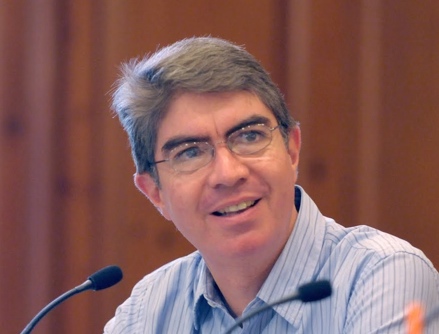 There’s nothing quite like the movies if you want to learn what people’s hopes and dreams were during the period in which they were made. Take for instance the recent “Up in the Air“. In the present when air travel has turned into something to be endured, George Clooney‘s Ryan Bingham showed us how it can become an enticing way of life. The same subject was also portrayed extensively, under a very different light, some forty years as the “Airport” movies dealt with our fears of dying in new and horrible ways, while glamorizing our dreams of flying first-class, surrounded by a movie star in every seat. As the trailer for one of these features once put it: “on board, a collection of the rich and the beautiful!” They also marked the advent of a new genre (the Disaster Film) as well as the “Ark movie” which Ebert’s Little Movie Glossary defines as “mixed bag of characters trapped in a colorful mode of transportation”. How many films can claim to this kind of impact?
There’s nothing quite like the movies if you want to learn what people’s hopes and dreams were during the period in which they were made. Take for instance the recent “Up in the Air“. In the present when air travel has turned into something to be endured, George Clooney‘s Ryan Bingham showed us how it can become an enticing way of life. The same subject was also portrayed extensively, under a very different light, some forty years as the “Airport” movies dealt with our fears of dying in new and horrible ways, while glamorizing our dreams of flying first-class, surrounded by a movie star in every seat. As the trailer for one of these features once put it: “on board, a collection of the rich and the beautiful!” They also marked the advent of a new genre (the Disaster Film) as well as the “Ark movie” which Ebert’s Little Movie Glossary defines as “mixed bag of characters trapped in a colorful mode of transportation”. How many films can claim to this kind of impact?
Every generation has its own memorable movies that allow contemporaries to relate to one another and, for better or worse, mine had the “Airports”. On the days before Home Video you first found yourself at school discussing the rumored crisis that the new plane would have to face; then you watched in awe those coming-soon posters and trailers with their usual, immortal last line: “…and George Kennedy as Patroni!” Next you stood in long lines to see the movie, attended the re-release and anxiously awaited their TV debut, only to later wonder exactly what redeeming quality about them made you go into such extremes in the first place. Any sensible adult would have questioned the reasoning behind this process early on which leads me to believe it was only the pre-teens from such days who could ever fully appreciate them. Looking back, even though their fads look comically dated and the films themselves haven’t stood the test of time by any stretch; their peculiarities make for the best kind of guilty pleasure material.
When talking about The Great Films, the topic of the “Airport” movies doesn’t often come up and, in fairness, it never should. Watching them now it’s rather obvious they were done with absolute conviction and that their creators, much like Ed Wood before them, clearly thought they were making something great. Even though the 1970s are remembered as an extraordinary time for revolutionary films, the dawn of that decade will always have the distinction of giving us a certain best-seller (“translated into fourteen languages!”) that was made into a big-budget production and spawned three blockbuster sequels, reunited countless big name stars (granted, not precisely in their prime) and rewarded the original entry with ten Academy Awards nominations (you can look it up). That’s one less than “The Godfather“, one year before. Today the “Airports” are mostly remembered as the inspiration to some magnificent Mad Magazine spoofs and the wildly successful “Airplane” but personally I believe the latter isn’t half as fun as any one of them, it felt more like the cartoon of a parody.
Before unions, Airline deregulation and the invention of Frequent Flying Miles, the concept of Air Travel was somewhat different than it is today. Flight attendants were idealized as the epitome of beauty and amiability so it’s no surprise that the human relationships in each of these films focused first and foremost on their extra-marital affairs with our main protagonists, the pilots. Audiences invariably forgave their indiscretions as both groups were depicted in an otherwise heroic and self-sacrificing fashion. Each feature would inevitably start with the introduction of the players and their dilemmas: there were children who required organ transplants, marriages on the brink of divorce, grandpas who were eager to finally meet their estranged grandchildren, and so on. The aeronautical catastrophe in turn would put these matters in hold and by the end, they would all naturally get resolved.

The first “Airport” movie (1970) centered on the heroic efforts by its personnel to keep it functioning under extreme weather conditions. There we meet Airport Manager Mel Bakersfeld (Burt Lancaster) whose wife drives through the snow storm that blocked every road available (wearing full make-up, fur and pearls), in order to inform him she’s tired of him always coming late for supper, so she wants a divorce; luckily, he just happens to have his lovely (and much nicer) assistant Tanya Livingston (Jean Seberg) waiting in the wings. We also had the gorgeous flight attendant, Gwen Meighen (Jacqueline Bisset), who somehow allowed herself to get pregnant by the much older Capt. Vernon Demerest (Dean Martin) and decides to let him know about it precisely on this eventful night (the sole fact that the script briefly described their predicament was enough to warrant the film the equivalent of an “R” rating here in Mexico, which meant I had to wait until junior high before being able to see it). Finally, we encounter “Airport” icon, though-no-nonsense Joe Patroni (George Kennedy) who knew more about airplanes than anybody alive and as a result, he would be the one to let us know the dreadful consequences of failure in every entry of the series.


“Airport” dealt with so many human contingencies (“seven stories tied into one!”) that a new cinematographic technique was developed to allow them to be displayed simultaneously, by splitting the screen in various shapes of smaller parts (a la “Brady Bunch”). The end result was that we couldn’t really concentrate in any one of them so this was first and last time such procedure was ever used. Our aerial cataclysm in turn had to do with a broke and depressed man (Van Heflin) who decides to bring along an explosive device on board so his wife will be able to collect the life insurance policy he just purchased at the terminal. Good thing for him that American airport security on those days consisted of a couple of staff members who noticed him nervously holding a suspicious looking briefcase and pointed out to each other: “don’t worry, Italian customs will surely get him”.



Humor was a key factor in defusing the tension of every “Airport” movie. In the first entry it was mostly incarnated in little old lady and stowaway Ada Quonsett (played by Academy Award winner Helen Hayes) and her pre-9/11 techniques of flying for free. When Captain Demerest learns of the bomb situation in mid-flight, he figures that the best possible approach to the crisis is to recruit her so she can snatch away the briefcase from the madman. He also casually blurts out the word “bomb” in front of every living soul on board (“for crisis authenticity, Airport has no equal!”) but the plan somehow fails and the weapon goes off, putting a hole in the fuselage and forcing Patroni to help lead the Boeing 707 pilots into a safe landing.
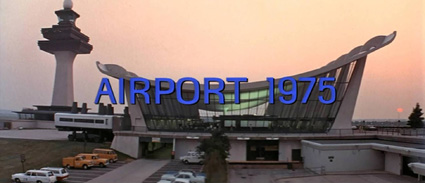
“Airport” is not a very good movie; it’s not even one of the better “Airports” but it was followed nonetheless by “Airport 1975” (surely named as such because the date sounded rather futuristic back then). ’75 used the same formula of so many other sequels: make everything bigger and give us more stars, more comic relief, a bigger crisis and a Jumbo 747 instead of a 707.


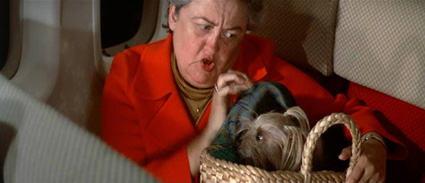


The plot dealt with the aviator of a little Cessna suffering a massive heart attack and his plane drifting and crashing into our Ark, leaving all the pilots dead or unable to speak in full sentences, Flight attendant Nancy Pryor (Karen Black) takes over as the control tower gives her instructions on how to guide it through dangerous mountain territory until her lover Alan Murdoch (Charlton Heston), can be lowered via helicopter into the resulting hole at the cockpit and land it. Assertive women roles were nothing new in those days so it’s a disappointment that while Heston got to utter such grandiose lines as “climb baby climb!” and “damn…break pressure is dropping!”, Nancy is seen constantly panicking, ripping the remaining control panels (which may have been there for a reason) and communicating with the tower uttering phrases the likes of “…I’m scared, please help us!” The most frightening moment in ’75 can surely be found in the scene involving a failed rescue attempt, with a close-up of her screaming at the top of her lungs (based on the passengers’ reactions, she was clearly heard from one tip of the 747 to the other.)

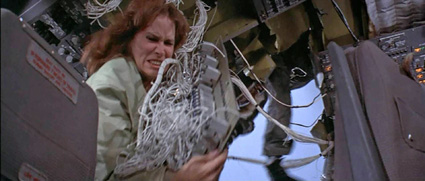
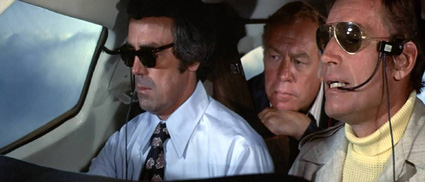
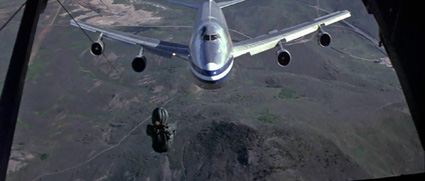

These kinds of flaws are not restricted to the leads as the rest of the cast isn’t much more memorable: our old stowaway isn’t back but an unidentified lady is seen sneaking a dog in her purse (undetected by airport security of course). A nun named Sister Beatrice (Martha Scott) points at Gloria Swanson and mentions “that must be one of those Hollywood persons”, while her singing colleague Sister Ruth (Helen Reddy) comforts sick youngster Janice Abbott (Linda Blair) with a ballad in a rather disturbing scene, as we still haven’t gotten over the way the latter greeted her last religiously-attired visitor.



“Airport 1975” has a few worthy contributions to the genre such as some real 747 rescue footage and a couple of exciting shots of the plane barely missing the mountains (which it isn’t easy telling how they were accomplished), but the film’s main weakness is that the nature of the catastrophe leaves us with only two possible resolutions, either: a) the plane goes down and everybody on board is killed, or b) it doesn’t, and by the looks of this particular group (wives, girlfriends, children, real life comedians and dogs) there’s not much mystery on what the answer will be. Once the craft inevitably lands, nothing much happens except for the wing crashing with a very badly located booth (right alongside the landing strip). The rest of the cast will do their best to make things exciting by frantically hurrying down the inflatable landing slides (with Swanson’s stunt-double hitting it as full speed) in contrast to the romantic leads who oblivious to the crisis, will slowly walk alone down the plane’s ladder with their arms held around each other as the credits roll.
As these things go, follow-up “Airport ’77” was a fairly good movie. The 747 full of priceless art, (along with the rich and the beautiful) is hijacked and crashes with an oil-rig in the Bermuda Triangle, vanishing in the ocean in submarine fashion as the plane withstands the water pressure just fine (without the lights ever ceasing to function as well).








While ’75’s cast included the likes of Erik Estrada, Sid Caesar and Jerry Stiller, this one had extended contributions by such movie legends as James Stewart, Joseph Cotten, Olivia De Havilland and the great Jack Lemmon who passionately delivers the typical “Airport” lines without sounding foolish (the ultimate compliment for any actor). His character’s relationship with Eve Clayton (Brenda Vaccaro) is easily the most believable in the series and Christopher Lee is also excellent as Lee Grant‘s suffering husband. The film has plenty of the usual hokey dialogue and characters (instead of a singing nun we now have a singing blind man who dies a few minutes after finally finding true love) but this time around not every passenger on board will make it out alive which does lead to some suspense. This is clearly the best “Airport” feature.

Whatever improvement came with ’77, the series went completely down the drain with “The Concorde…Airport ’79”, the fourth and last entry in the series. Billionaire Dr. Kevin Harrison (Robert Wagner) decides to get rid of his love interest/reporter Maggie Whelan (Susan Blakely) in order to avoid her publishing an incriminating story about his illegal arm-deals past, but instead of simply doing away with her during one of their many lone meetings, he goes through the trouble of aiming missiles at the Concorde she’s taking to Moscow via Paris, forcing newly promoted Captain Patroni to shoot flares at the coming drones from the open cockpit window at supersonic speed (while the plane is upside down). What’s most amazing is that after miraculously surviving various close calls, the passengers still keep climbing back on board for the next leg of their journey.


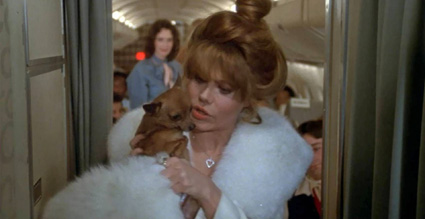
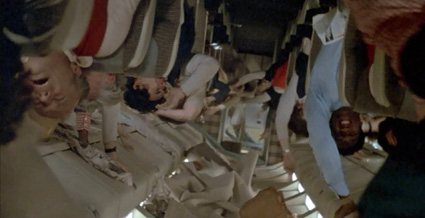


A new cinematographic technique was also developed for ’79 and it involved a spinning cabin-set, with screaming stunt doubles going round and round while various objects fly all over the place (surprisingly, no stars volunteered to appear in these scenes). The worst in the series by far, with amateurish SF/X that will never allow us to complain about CGI again, and characters played by the likes of John Davidson, Jimmy Walker and Charo (in her own, even less believable stowaway-dog predicament) the movie feels like a badly cast “Love Boat” episode and the series ends up becoming a parody of itself. Written (believe it or not) by Eric Roth (“Forrest Gump“, “The Insider“, “Munich“), “The Concorde…Airport ’79”, is the kind of feature that redefines whatever scale used to exist for judging bad movies and resides at the very bottom of the Disaster, Ark, Action/Adventure and Live-Action Film heaps. For a series that once seemed like it would go on forever, it also made sure no further talk about making another “Airport” ever surfaced. Bad sequels are like restaurants, once you have a terrible experience with one of them, you never, ever want to go back.
Should Hollywood ever consider making another “Airport” sequel or a remake? I don’t think so. We now live in a world, in which this previously alluring way of transportation is seen as the equivalent of taking a bus with wings (but not before having every follicle on your head inspected).. Besides, 9/11 and “United 93” made this subject more shocking and uncomfortable than any movie produced for entertainment purposes should ever aim at becoming. If you doubt this, just measure your own reaction by looking at the title for ’77, with a shot of a plane passing over the U.S. Capitol. At the end, our consolation is that even though 1990’s “Die Hard 2: Die Harder” came from a different franchise, it is actually the best “Airport” movie ever made and moreover, we’ll always have the four “Airports” to go back to and fondly remember a very different world that indeed once existed.
